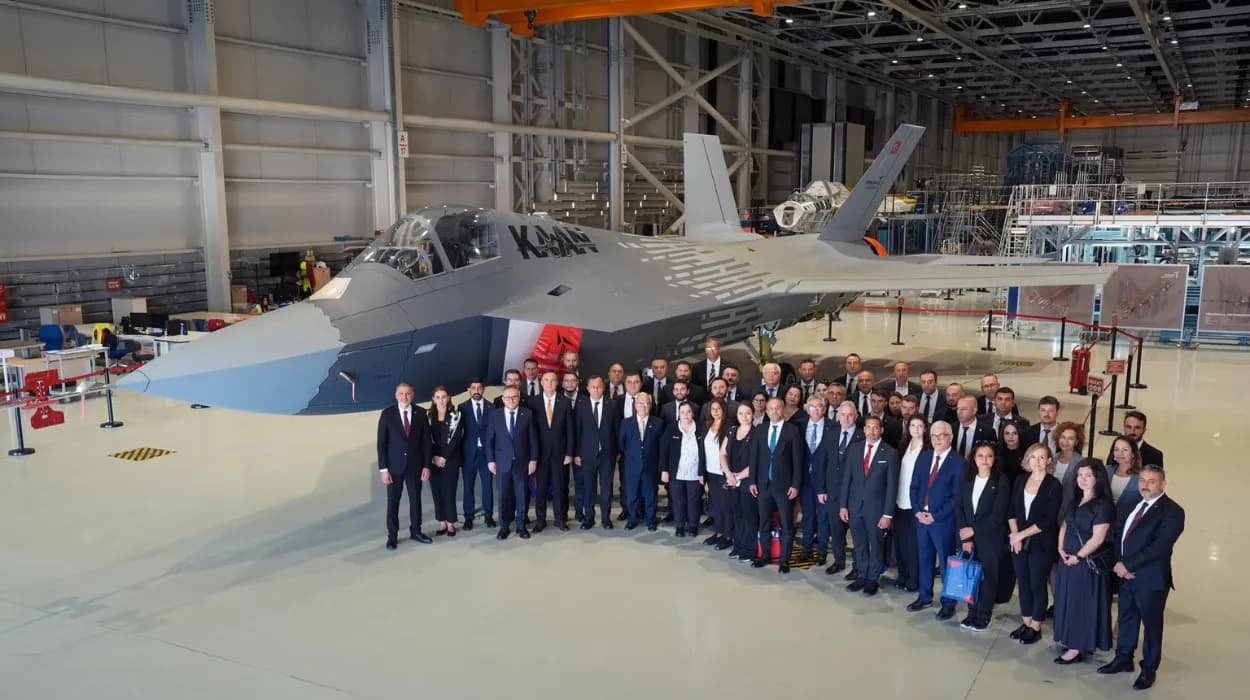Summary
- US Congress blocks export licenses for engines vital to Turkey’s KAAN fifth-gen fighter jet.
- This delays flight-testing, production, and export plans.
- The blocked engines are US-made F110 turbines used in KAAN prototypes.
The second prototype of Turkey's domestically produced fifth-generation Kaan fighter is already well along, but Turkish Aerospace, the manufacturer, is having trouble locating powerplants for the jets' production.
On September 26, 2025, a photo published by the Turkish Armed Forces Strengthening Foundation (TSKGV) showed the second Kaan prototype in the background. Standing in front of the first Kaan prototype, the photo depicted a TSKGV group visiting Turkish Aerospace's facilities in Kahramankazan, close to Ankara. Although it didn't seem to have either wings or a tail, the second prototype's fuselage's interior structure looked to be mostly finished.
After suspending Turkey's participation in the F-35 Joint Strike Fighter program the year before, the US State Department imposed penalties against Turkey on December 14, 2020, under the Countering America's Adversaries Through Penalties Act (CAATSA).
This resulted from Ankara's determination to move forward with the purchase of the Russian S-400 air defense system, despite the US government's warning that doing so would reveal the F-35's stealth advantages due to Turkish hosting of Russian technicians. This ultimately resulted in Turkey being kicked out of the F-35 program completely, as well as a prohibition on all defense-related US export licenses to the country.
After hosting Turkish President Recep Tayyip Erdoğan at the White House in Washington, DC, on 25 September 2025, US President Donald Trump hinted of the potential for Türkiye to be allowed to buy F-35s if it stopped buying Russian oil, although this seems problematic, given that Ankara proceeded with its S-400 purchase.
However, Turkish Foreign Minister Hakan Fidan stated on 26 September, “At present, the F-35s we are expecting and Kaan’s engines are being held up in the US Congress, with their export licences frozen. Those licences must be activated and the engines delivered so that Kaan’s production can move forward.”
Although two US General Electric F110-GE-129 turbofans, which were part of the first batch of these powerplants provided to Turkish Aerospace before the US sanctions, power the first Kaan prototype, it is obvious that several dozen turbofans would be needed for the Kaan to go into production.
Tusaş Engine Industries (TEI) of Turkey and TRMotor are working together to build an indigenous powerplant for the Kaan called the TF35000 turbofan, but it is unlikely that the aircraft will be ready for integration before 2032.
In his remarks, Fidan said that if the CAATSA problem is not fixed, Türkiye will have to look for another powerplant provider. One possible remedy in this respect could be found in China's WS series of combat power plants.
Although Turkey is still a member of NATO, the Erdoğan administration's foreign policy approach has frequently caused the nation to clash with the organization. This was exemplified by the acquisition of the S-400 system, but more recently, Erdoğan has maintained friendly ties with Russia and China, NATO's enemies. For instance, Erdoğan was one of the national leaders in attendance at the Shanghai Cooperation Organization (SCO) 2025 summit in Tianjin, China, when he met with Russian President Vladimir Putin and Chinese President Xi Jinpeng.
Another dilemma concerning the Kaan program and Turkey's defense export licenses is how likely it is that the US government will support the creation of a fifth-generation fighter in 10 years.
What are the immediate impacts on KAAN test flights and timeline?
The KAAN program has completed its initial prototype, which had its first flight in February 2024. A second test flight of this prototype occurred later that year. Two additional prototypes are under construction, with flight tests beginning for one by mid-2026 and the other by early 2027.
The first production blocks rely on engines manufactured in the US by General Electric (GE) F110. The US Congress’ temporary suspension of engine license exports introduces a risk of delay in flight testing, early deliveries, and commitments to other export partners, namely Indonesia.
Turkish defense officials, including Haluk Görgün, (head of the Presidency of Defense Industries) claim that "although the blockade is in place," the program "is facing no delays."

